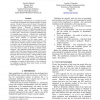Free Online Productivity Tools
i2Speak
i2Symbol
i2OCR
iTex2Img
iWeb2Print
iWeb2Shot
i2Type
iPdf2Split
iPdf2Merge
i2Bopomofo
i2Arabic
i2Style
i2Image
i2PDF
iLatex2Rtf
Sci2ools
FLAIRS
1998
1998
Investigating the Validity of a Test Case Selection Methodology for Expert System Validation
Providing assurances of performance is an important aspect of successful development and commercialization of expert systems. However, this can only be done if the quality of the system can be assured through a rigorous and effective validation process. However, a generally accepted validation technique that can, if implemented properly, lead to a determination of validity (a validity statement) has been an elusive goal. This has led to a generally haphazard way of validating expert systems. Validation has traditionally been mostly done through the use of test cases. A set of test cases, whose solution is previously known and benchmarked, is presented to the expert system. A comparison of the system's solutions to that of the test cases is then used to somehow generate a validity statement. It is an intuitive way of testing the performance of any system, but it does require some consideration as to how extensively to test the system in order to develop a reliable validity stateme...
Related Content
| Added | 01 Nov 2010 |
| Updated | 01 Nov 2010 |
| Type | Conference |
| Year | 1998 |
| Where | FLAIRS |
| Authors | Jan-Eike Michels, Thomas Abel, Rainer Knauf, Avelino J. Gonzalez |
Comments (0)

